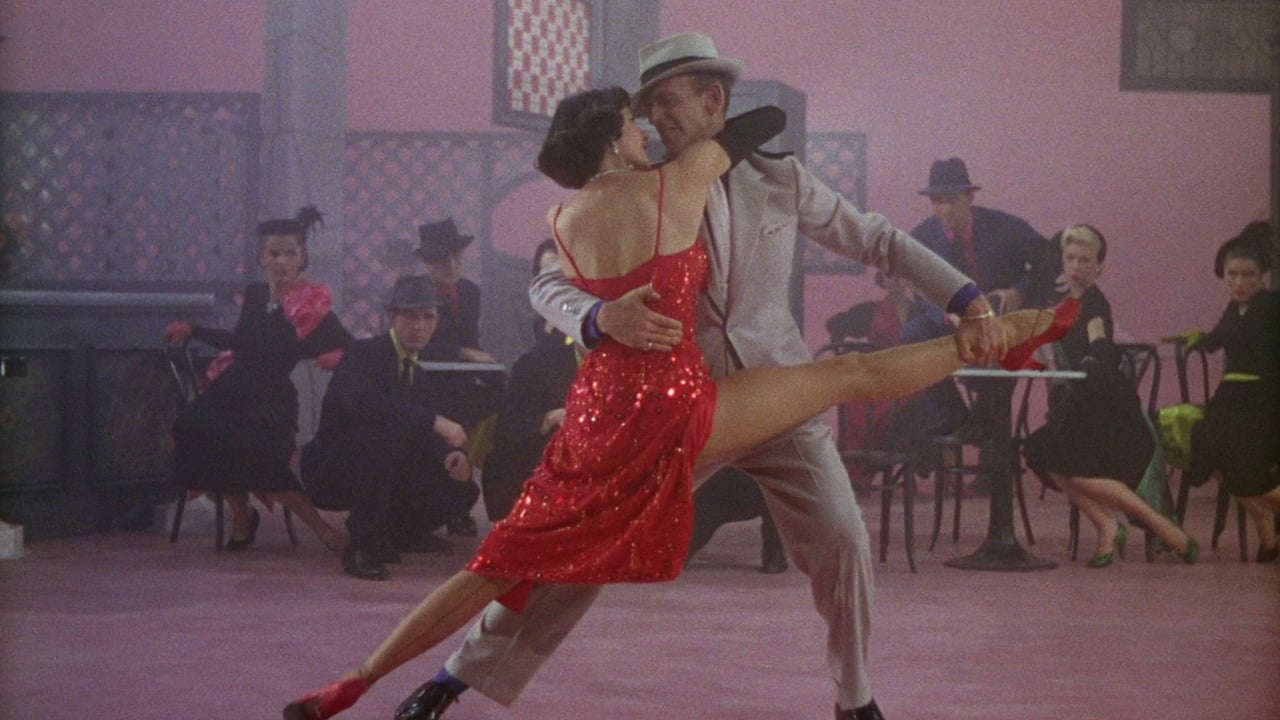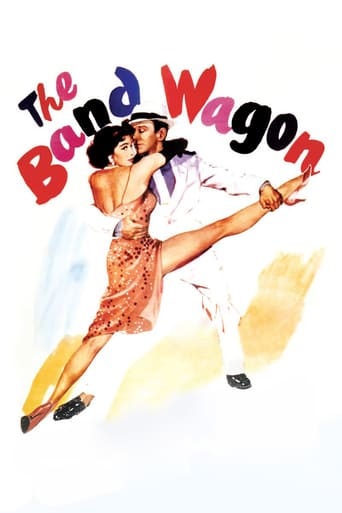

I sit on the fence, a little, when naming my favorite musical of all time. 'West Side Story' really does stand alone, but it is not the usual Hollywood musical. For that, I am always torn between 'Singin' in the Rain' and 'Band Wagon'...Two giant testaments to what musicals could do when written with wit and charm, played exquisitely, sung and danced with originality, spunk,and whirlwind teamwork. Band Wagon is a monumental achievement by looking so relaxed and easy, and following a story line that spells of REALITY. Yes, a potential Broadway flop is like it is in the depiction of this pre-Broadway tryout Brilliant storytelling - a has been Hollywood star, a dancer trying a first time Broadway showcase, a supposed 'genius; of the theater world, etc. And the music - wow! - including the new 'That's Entertainment'!! 'Triplets' is a howl, and the Astaire-Charisse 'Dancing in the Dark' is flawless without being flamboyant. This one is a treasure trove of what was best in the Hollywood of yore. But still torn between this one and 'Singin' in the Rain', with a special spot eternally reserved for 'West Side Story'. Of course, now I think of adding 'An American in Paris' - it, too, is in the pantheon. And just below them is a half-forgotten masterpiece from Columbia -- The fantastic Betty Garrett, the lovely and lithe Janet Leigh, the superb Jack Lemmon...and the brilliant work of Bob Fosse and Tommy Rall - the dance in the alleyway behind the burlesque theater - the musical version of My Sister Eileen. The studio had wanted to film the same story as done on Broadway - Wonderful Town - but rights somehow got involved. But this film, with a new score, is lyrical and comedic dynamite!
... View MoreThe Band Wagon (1953)**** (out of 4)Very entertaining musical about washed up actor Tony Hunter (Fred Astaire) who agrees to go back on Broadway when his two friends white a new play for him. The only problem is that the eccentric director Lester Marton (Oscar Levant) decides to throw out everything in the story and come up with something original but this here just ruins everything. THE BAND WAGON is one of many legendary musicals that Astaire would make throughout his career and it's certainly a very rewarding one. As with a lot of films in the genre, the story itself is pretty simple but the director and cast manage to do quite a bit with it. I really liked how Astaire is pretty much playing himself as there are all sorts of winks to fans of his that give you a chance to go down memory lane. There's a very good wink to TOP HAT among many other pictures and they're quite funny. Even better are the constant name-dropping of various celebrities and how things were changing in Hollywood. Astaire talking about him not being Marlon Brando was funny and I think it's clear that everyone was trying to make an old-fashioned musical before Hollywood went into a completely different direction. It should come as no shock but Astaire is perfect in the lead role with his dancing moves and singing voice being as great as ever. His comic timing here is also on full display and the actor is clearly enjoying the role. Cyd Charisse is also very good in the role of the co-star who battles with Astaire at first before the obvious love story kicks in. Levant nearly steals every single scene he's in as the crazy director and I've often wondered if this role was based off Orson Welles. THE BAND WAGON contains some beautiful cinematography, countless fun songs and overall it's just a real joy to sit through.
... View MoreIt is a brave film which has a song called That's Entertainment! as its signature number. Because if, as is unfortunately the case with The Band Wagon, the film is not great entertainment...well, the negative review practically writes itself. This is a film which has the good fortune to have two great talents, Fred Astaire and Cyd Charisse, and the misfortune of completely wasting them. It's a film full of largely forgettable musical numbers and it has a story which never really engages and which in the end goes off the rails completely. To call the film tedious would be harsh but not entirely untrue. The film goes for laughs but fails rather miserably in that regard. It tries to give you a little romance but that angle never heats up. The film has no flow to it, there is a real disjointed feel throughout. No, this is not entertainment.Astaire plays declining movie star Tony Hunter. His friends Lester and Lily Marton have written a stage show which they think can revive his career. They bring it to noted Broadway director/producer/star Jeffrey Cordova who decides to turn what was written as a light comedy into a serious, and seriously bizarre, retelling of Faust. Not surprisingly this proves disastrous. Lester and Lily start bickering. The play, which no longer makes any sense whatsoever, spirals out of control. And all the while tension rises between Tony and his costar, ballerina Gabrielle Gerard. Tony is intimidated by Gabrielle's youth and beauty, not for no reason with Charisse playing the part. And he thinks this classically trained ballerina has no respect for his style of hoofing. Tony and Gabrielle have no chemistry, can't stand one another, can't work together. Eventually they do come together somewhat which provides the film with perhaps its one true highlight, Astaire and Charisse with a wonderful, beautiful dance in a park. Unfortunately after that Tony and Gabrielle's play continues to crumble and so does the film. By the time Astaire and Charisse dance together again much later on the film is past the point of being salvageable.Astaire and Charisse really were hung out to dry here. The supporting cast adds nothing. The loony Cordova character is meant to be over-the-top but Jack Buchanan goes way too far with it. This character is too nuts for the film's good. At least he has some spark to him which is more than can be said for the writing couple, Lester and Lily. Oscar Levant and Nanette Fabray play those parts quite lifelessly. And James Mitchell, playing a romantic interest for Gabrielle, is a total wet blanket with all the personality of a doorknob. The musical numbers all fall flat and many make no sense whatsoever. By the end the film is just throwing random songs up on the screen to see what sticks. None of it does. Some of the numbers in the film's homestretch are obviously meant to be funny but they are just terrible, producing groans not laughs. The big final number is a little better even if, as with so much of what preceded it, it makes very little sense. The best musicals have a lot of life in them. The Band Wagon does not. The energy just is not there. The story doesn't work, the songs are forgettable, the performances of the supporting cast leave much to be desired. Astaire and Charisse have a couple of moments. A couple of moments is not enough to make a good film.
... View MoreThis Fred Astaire film is a bit unique. For once, Astaire plays a man much like himself and this self-deprecating humor makes the film quite enjoyable. For example, the film begins with a couple guys on a train talking about how great Tony Hunter (Astaire) WAS but how he's a bit washed up now---and Hunter is sitting behind a newspaper and he loudly agrees with them! Later, when he's paired with Gabrielle (Cyd Charisse), he complains that he's much too old for her! The story begins with Hunter arriving in New York city to meet a couple old friends who want him in their newest production. Lester and Lily (Oscar Levant and Nanette Fabray) think it's a great idea to get a big-name but EXTREMELY self-absorbed actor-director for this production. However, Cordova (Jack Buchanan) wants to completely take over the show and make it his vision--a vision that is quite the opposite of Hunter's style. The show seems destined to fail. Can there be any way to save it from this megalomaniac? The show features many excellent production numbers--all of which are very polished and exciting to watch. The most memorable occurs early in the film when they sing "That's Entertainment" but several other numbers really are crowd-pleasers (like the weird one where they are dressed like babies). As for the story, it's enjoyable and light. My only complaint is Levant. During the 40s, 50s and 60s, he was one of the cleverest raconteurs in Hollywood and on television and was able to deliver wonderful one-liners that could bust your gut. Here, however, he's hardly noticeable. Could it be that they misused him? Or, possibly, that Levant was having emotional problems and just wasn't himself (he was VERY public about his history of Bipolar Disorder). I just know that I was hoping to hear the snappy Oscar Levant. As for the rest, they are all quite good and the film quite enjoyable--one of Astaire's best of the 1950s.
... View More